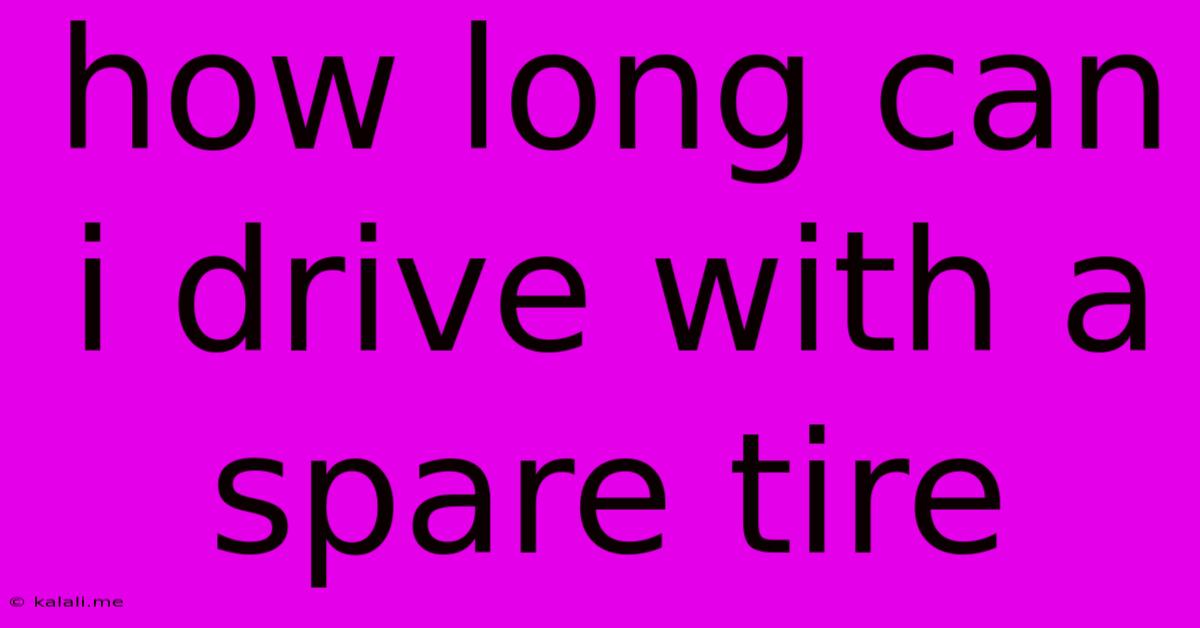How Long Can I Drive With A Spare Tire
Kalali
May 28, 2025 · 3 min read

Table of Contents
How Long Can I Drive on a Spare Tire? A Guide to Safe Spare Tire Usage
So, you've got a flat. No worries, you've got a spare! But how long can you actually drive on that spare tire before it becomes a safety hazard? This article will delve into the specifics of spare tire usage, addressing safety concerns and providing practical advice. Understanding your spare's limitations is crucial for ensuring your safety and the safety of others on the road.
Understanding Different Types of Spare Tires
Before we discuss driving times, it's important to understand the different types of spare tires:
-
Full-size spare: This is an identical replacement for your regular tire. You can drive on it for extended periods with no limitations, other than regular tire maintenance.
-
Compact spare (donut spare): Smaller than your regular tire, often made of different materials, these spares are designed for temporary use only. They're lighter and take up less space, but they have limitations in speed and distance.
-
Temporary/Emergency spare: Similar to a compact spare, these are designed solely for short-distance use to get you to a tire repair shop or replacement. These spares are usually explicitly marked with speed and mileage limitations.
-
Run-flat tire: These special tires can support your vehicle even when completely deflated. However, even these are not meant for extended usage and should be replaced as soon as possible.
Speed and Distance Limitations: The Crucial Factors
The most critical factors determining how long you can drive on a spare tire are speed and distance. Never exceed the maximum speed rating printed on the sidewall of your spare tire. This speed is usually significantly lower than your regular tires and is often around 50 mph (80 km/h). Exceeding this speed can lead to tire failure, causing a dangerous accident.
Distance limitations are less precise but generally follow the "temporary use" principle. For compact and emergency spares, aim to drive no more than 50 miles (80 kilometers). Driving further than that significantly increases the risk of damage to the spare tire, and its structure simply isn't designed for the stress.
Signs You Need to Stop Driving Immediately
Even if you're within the speed and distance limits, pay close attention to your vehicle's behavior. Stop immediately if you notice any of the following:
- Unusual vibrations: Excessive shaking or wobbling indicates a potential problem with the spare tire.
- Unusual noises: Grinding, squealing, or thumping sounds could signal tire damage or imbalance.
- Overheating: The spare tire, especially a compact one, can overheat more quickly than a regular tire, leading to failure.
- Tire pressure loss: Regularly check the tire pressure and address any significant drops immediately.
Post-Spare Tire Use Considerations
Once you've reached your destination, replace the spare tire with a properly inflated and balanced regular tire as soon as possible. Even if the spare tire seemed fine during use, it's always best to have a professional inspect it to ensure there's no hidden damage.
Conclusion: Prioritize Safety
Driving on a spare tire is a temporary fix. Prioritize safety by adhering to speed and distance limitations, monitoring your vehicle's behavior, and replacing the spare promptly. Remember, your safety and the safety of other drivers is paramount. Understanding your spare tire's capabilities and limitations can make all the difference in a potentially dangerous situation.
Latest Posts
Latest Posts
-
Can You Put Multiple Cards Down In Uno
May 30, 2025
-
Will Dog Whistles Stop Dogs From Barking
May 30, 2025
-
How To Hang Frames On Cement Walls
May 30, 2025
-
Did Judith Die In Walking Dead
May 30, 2025
-
How To Find Past Wifi Connection Mac
May 30, 2025
Related Post
Thank you for visiting our website which covers about How Long Can I Drive With A Spare Tire . We hope the information provided has been useful to you. Feel free to contact us if you have any questions or need further assistance. See you next time and don't miss to bookmark.